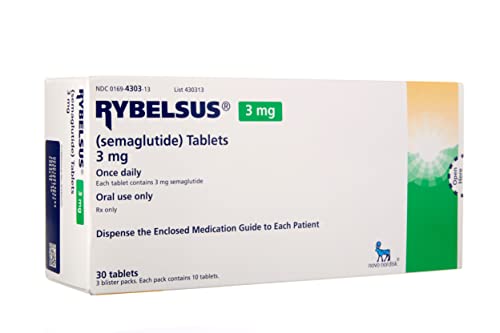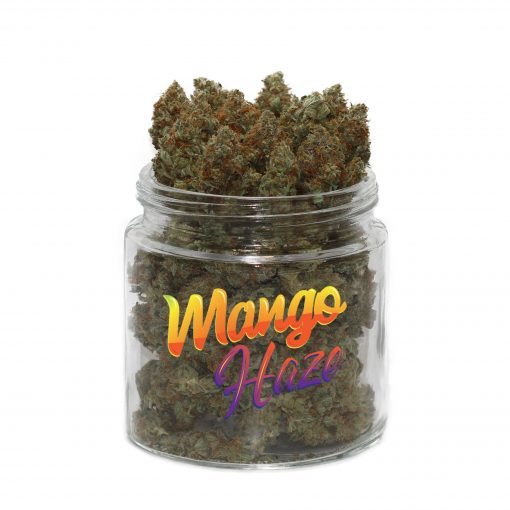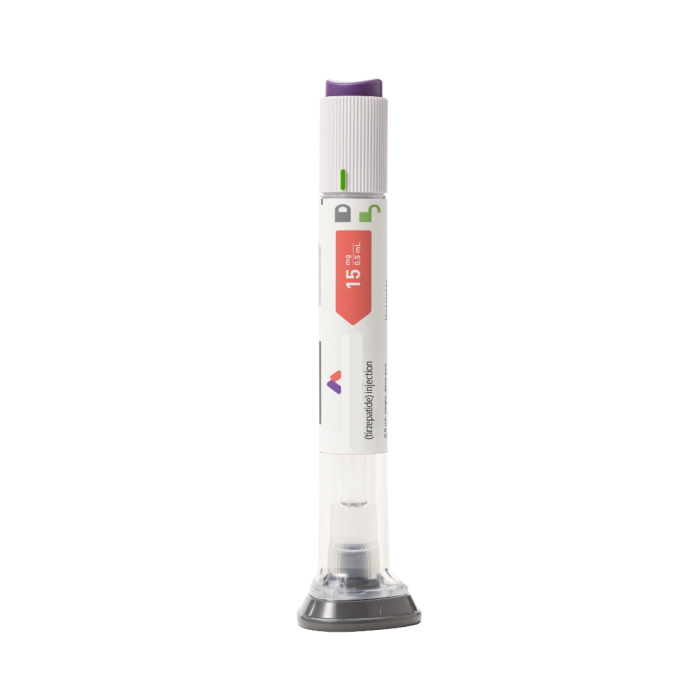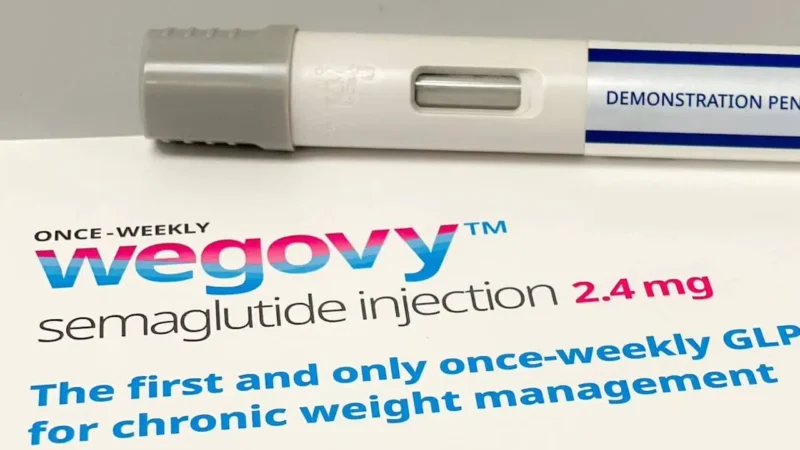Description
Approved by the FDA, Rybelsus is intended for use in conjunction with diet and exercise to improve glycemic control in adults with type 2 diabetes. However, it is not recommended as the first line of treatment. The drug is also not suitable for people with type 1 diabetes or for treating diabetic ketoacidosis.
As a pioneering oral solution in the realm of diabetes management, Rybelsus represents a significant advancement in the ease and convenience of treatment for many patients struggling with daily injections.
Unlike some other diabetes medications, Rybelsus does not just increase insulin production. It also reduces the liver’s glucose production and slows down the digestion process, leading to a more gradual absorption of sugars into the bloodstream. This multi-faceted approach helps in reducing the spikes in blood sugar levels post-meal, a common challenge for individuals with type 2 diabetes.
Furthermore, Rybelsus has an appetite-suppressing effect, which can be beneficial for weight management – a significant factor in diabetes care. This combination of regulating blood sugar levels and potential weight loss makes it a valuable option for long-term diabetes management.
The availability of different dosages provides an opportunity for healthcare providers to start patients on a lower dose and gradually increase it based on the patient’s response and tolerance to the medication. This stepped approach helps in minimizing potential side effects while optimizing blood sugar control.
Being an oral medication, Rybelsus is also associated with improved patient adherence and satisfaction, as it eliminates the need for regular injections that many diabetes medications require.
The duration of Rybelsus’s effect is sustained throughout the day, making it a once-daily medication. This consistent level of drug in the body helps in maintaining steady blood sugar levels, reducing the risk of the high and low blood sugar episodes that can occur with other types of diabetes treatments.
Patients are advised to take Rybelsus at the same time each day, preferably in the morning, to maintain a consistent effect. Its long-lasting action also means that missing a dose can have a noticeable impact on blood sugar control, so adherence to the dosing schedule is crucial.
The tablet must be swallowed whole and should not be split, crushed, or chewed. This is important for the medication to work correctly as it is designed to be released slowly in the body.
If a dose is missed, the next dose should be taken at the regular scheduled time the following day. Doubling up doses is not recommended, as it can increase the risk of side effects.
Those with a personal or family history of medullary thyroid carcinoma (MTC) or Multiple Endocrine Neoplasia syndrome type 2 (MEN 2) should avoid Rybelsus, due to the potential risk of thyroid tumors.
It is also important for individuals with severe gastrointestinal diseases, as Rybelsus can affect gastric emptying, and for those with severe kidney problems, as the medication’s effect and side effects might be altered in these conditions.
In clinical trials, Rybelsus has shown to significantly reduce HbA1c levels, a marker of long-term blood sugar control, in patients with type 2 diabetes. This reduction in HbA1c is accompanied by weight loss in many patients, which is beneficial given the close relationship between obesity and diabetes.
Furthermore, the ease of use and once-daily dosing regimen of Rybelsus contribute to better adherence and patient satisfaction, which are crucial factors in the long-term management of chronic diseases like diabetes.
Studies have shown significant reductions in HbA1c levels, indicating improved long-term glucose control. Patients often experience better glycemic stability when switching to Rybelsus from other diabetes medications.
Rybelsus also aids in weight management, an essential part of diabetes care. Its impact on appetite pathways leads to decreased calorie intake and modest weight loss, contributing to improved metabolic health.
More serious side effects, though rare, include pancreatitis, changes in vision, and kidney problems. It’s crucial for patients to report any severe symptoms to their healthcare provider immediately.
Rybelsus is contraindicated in patients with a personal or family history of medullary thyroid carcinoma or Multiple Endocrine Neoplasia syndrome type 2. Caution is advised in patients with renal impairment or gastrointestinal diseases.
However, there are medications containing Semaglutide as the active ingredient. Semaglutide is sold under various brand names, including Ozempic, Wegovy, and Rybelsus.
Ozempic: This is a form of semaglutide used to improve blood sugar control in adults with Type 2 diabetes. Currently, no generic versions of Ozempic are available. The cost for Ozempic subcutaneous solution (2 mg/1.5 mL, 0.25 mg or 0.5 mg dose) is approximately $995 for a supply of 1.5 milliliters, depending on the pharmacy.
Wegovy: Another brand name for semaglutide, Wegovy is used primarily for long-term weight management. Wegovy is available in the form of a subcutaneous injection. This means it is injected under the skin. The medication is typically prescribed in prefilled, single-use injection pens. These pens are designed for ease of use and are intended to be self-administered by the patient following proper training in subcutaneous injection technique. The dosing of Wegovy is generally started at a lower dose and gradually increased over time to reduce gastrointestinal side effects. The injections are usually given once a week, and the schedule and dosage adjustments should be followed as prescribed by a healthcare professional.The list price for Wegovy in the United States is around $1,500 per month.
Rybelsus:
- Formulation: Oral tablet.
- Storage Temperature: Room temperature, typically between 68°F and 77°F (20°C to 25°C), making it convenient for travel and for those without consistent access to refrigeration.
- Shelf Life: Rybelsus has a longer shelf life at room temperature compared to Ozempic and Wegovy, which require refrigeration before and sometimes after opening.
Ozempic:
- Formulation: Injectable pen.
- Storage Temperature: Requires refrigeration before first use (36°F to 46°F or 2°C to 8°C). After first use, it can be stored at room temperature (up to 86°F or 30°C) but must be discarded after 56 days.
- Considerations for Travel: Storage flexibility after opening is beneficial, but initial refrigeration requirement can be a constraint for transportation.
Wegovy:
- Formulation: Injectable pen.
- Storage Temperature: Similar to Ozempic, Wegovy also requires refrigeration before use. After opening, it can be stored at room temperature but with a limited use period of 30 days.
- Transportation: While it offers some flexibility after opening, the initial refrigeration requirement and the shorter window for use post-opening can be less convenient for travelers or those without consistent refrigeration access.
Rybelsus stands out for its room-temperature storage and longer shelf life, offering significant advantages in terms of storage and transportation convenience, especially for patients who travel frequently or lack easy access to refrigeration. In contrast, Ozempic and Wegovy, while offering some flexibility, still pose challenges due to their refrigeration requirements and shorter post-opening usage periods.
Patients often report better physical well-being and mental health, thanks to improved blood sugar control and weight reduction. These factors are crucial in enhancing the overall quality of life for individuals living with diabetes.
Moreover, the convenience of an oral medication, as opposed to injectables, can lead to improved medication adherence and patient satisfaction.
Emerging studies are also examining the broader implications of GLP-1 receptor agonists like Rybelsus in cardiovascular health, potentially expanding its therapeutic scope beyond glucose control.
The development of personalized medicine strategies may further enhance Rybelsus’s role in diabetes care, tailoring treatment to individual patient profiles for optimal outcomes.






Reviews
There are no reviews yet.